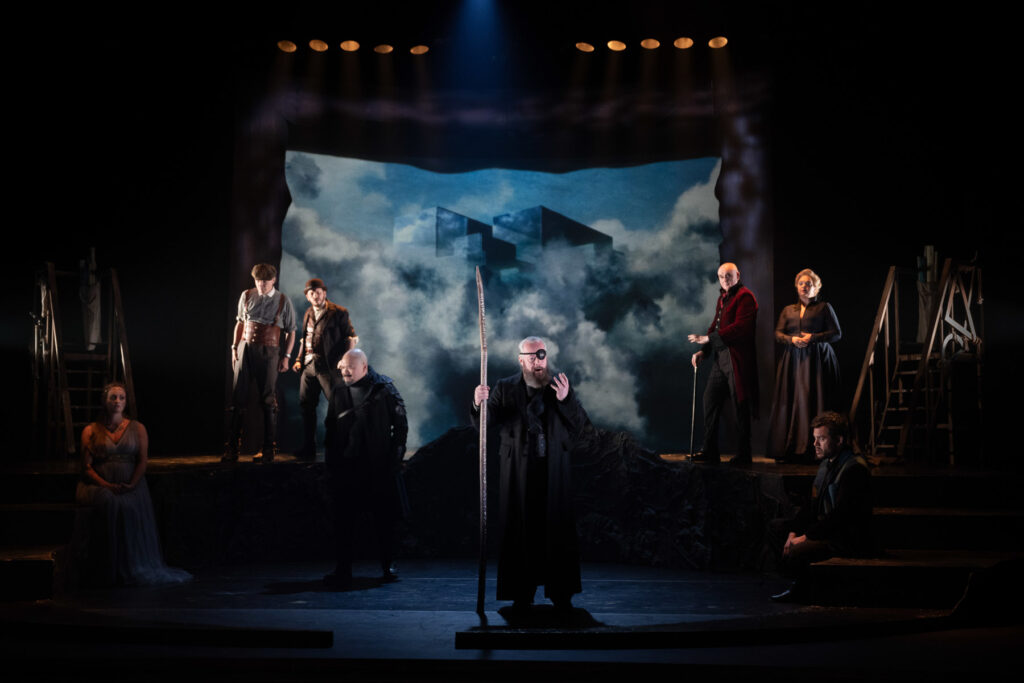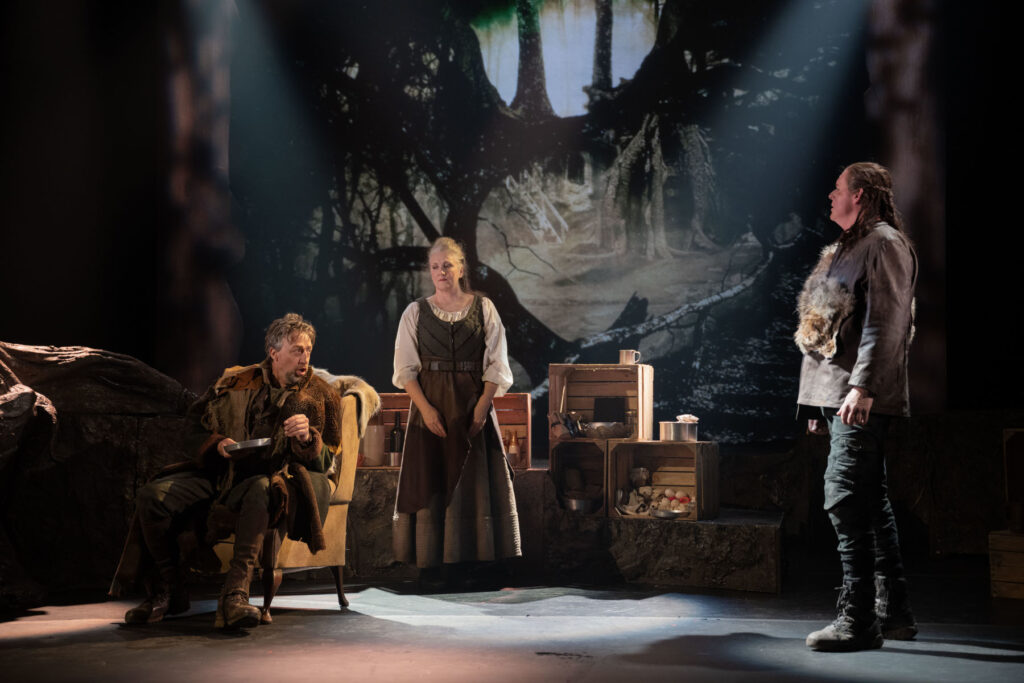Der Ring des Nibelungen is the centre piece of this year’s Longborough Festival – all four instalments of Wagner’s epic staged over three successive weeks. That the performances take place in a converted barn in rural Gloucestershire says much for the inspiration and resourcefulness of Martin and Lizzie Graham who established the enterprise back in 1991 – a founding year that brought an operatic dream of a British Bayreuth to reality. Artistic direction has now passed on to the couple’s daughter, Polly Graham, but Longborough continues as a Wagnerian Eden, and this glorious Ring cycle is the third in its distinguished history. In its early days, a dismissive critic declared its founders too ambitious. History has proved otherwise and the intimate space of Longborough’s 500-seat theatre brings a powerful intensity, with music-making elevated by eminent Wagnerians including Anthony Negus. His immersion in Wagner’s operas and two decades of conducting them at Longborough has provided one of Britain’s most authoritative and respected exponents.
This present cycle has been developing since 2019 with the pandemic interrupting its year-by-year progress and necessitating a semi-staging for Die Walküre. Common to each of the works is the production team and most of the cast. The impact of this is considerable; performances are now tremendously assured, characterisations now ‘lived in’, and are now capped by some interpretive tweaking under Amy Lane’s thought-provoking direction. Certainly, Das Rheingold brings nuances I don’t recall from its earlier incarnation. One such point of fine tuning is in the character of Wotan taken by the cavernous bass Paul Carey Jones. Although new to the role, he inhabits it perfectly, authoritative yet vulnerable, noble yet fatally flawed, his powers (and judgement) already on the wane. He first appears lost in thought, troubled and seemingly under the thumb of his wife Fricka, sung here with fierce intelligence and rich tone by Madeleine Shaw. Despite her apparent self-righteousness, her eye for Alberich’s stolen gold is clear. The relationship between Freia (a radiant Eleanor Dennis) and her captor Fasholt (a sympathetic Pauls Putnins and nicely differentiated from Simon Wilding’s treacherous and resonant Fafner) brings an imaginative twist, when she reciprocates his tender feelings for her. Has she already considered the caring Fasholt a favourable alternative, a means of escape even, to her own double-dealing family?

Elsewhere, Mark Stone’s wily Alberich reeks of opportunism and disappointment, his mahogany baritone contrasting well with the reedy tenor of Adrian Dwyer’s prancing Mime and Mark Le Brocq’s slippery Loge who, with his crimson frockcoat, sunglasses and twirling cane, amuses as much as he unsettles. Mae Heydorn, as the earth mother Erda, remains a compelling presence, delivering her warnings to Wotan with great solemnity. Completing the cast are Freddie Tong and Charlie Rochford as Donner and Froh and three frivolous Rhinemaidens – Marie Wyn Williams, Rebecca Afonwy-Jones and Katie Stevenson – their teasing of Alberich setting in train all subsequent events.
Rhiannon Newman Brown’s simple but effective set, lit by Charlie Morgan Jones, comprises two risers, evocative of rocky paths, linked by a low central summit. Behind these, Tim Baxter’s video projections bring mountain landscapes and elemental images taking us from the bowels of Nibelheim, through the depths of the Rhine and upwards towards an impressive cloud-capped Valhalla. The Nibelung’s smelting furnace is minimally sketched in with buckets of gold effortlessly carried by two members of the Longborough Youth Chorus – not exactly an army of dwarfs, but our imagination does the rest. Emma Ryott’s costumes make clear distinctions between each character.

Simplicity is the key to this staging and continues in Die Walküre. Act One’s hearthside domesticity is conjured by an armchair, a few crates and the faint glow of a fire, burning reluctantly like the loveless marriage between Sieglinde and Hunding. A sword is buried in an ash-tree stump and swirling video projections create galloping hooves, while the Ride of the Valkyries itself is suggested by urgent movement as each sister fights to control their steeds. It’s brilliantly effective.
From the infighting of Das Rheingold, we move to disturbing and fracturing relationships within Die Walküre: Ignorance to incest between the Wälsung twins Siegmund (a vividly projected Mark Le Brocq) and Sieglinde (a glowing Emma Bell); the marital breakdown between Sieglinde and Hunding (a menacing Julian Close whose spare movements are always invested in meaning), and affection to abandonment between Wotan (a sonorous Carey Jones) and Brünnhilde (a searing Lee Bisset with a weapons-grade upper soprano register). These transformative episodes are amongst the evening’s most emotionally charged – the developing feelings and knowing glances between Le Brocq and Bell bringing a tour de force of accumulating passion where, musically speaking, stage and pit are in perfect alignment, singers and players working together as a single unified body, with Negus generating sublime music making for some forty minutes, the emotional temperature far into the red. Similarly, the extended farewell between father and daughter of Act 3, is heartrending in its intensity: seldom have I witnessed such convincing singing and acting, Carey Jones’s conflicting emotions palpable when exiling Brünnhilde from Valhalla and Bisset’s distress at her rejection and pleading for protection moistens the eye.

No less persuasive is Madeline Shaw as the imperious and moralistic Fricka. She’s very much the unyielding, “I’ll-not-take-no-for-an-answer” kind of wife, with whom Wotan has become virtually impotent, his weakening powers foreshadowing the eventual demise of the gods. There’s no loss of his sable tone which carries round the auditorium magnificently. So too does the thrilling sound of eight Valkyries, a mini chorus that soars with every rhythmic thrust from the orchestra’s brass section.
And how well this hand-picked orchestra knows this music, with Negus alive to every detail of Wagner’s score, his grasp of musical architecture unassailable, and knowing when to push forward and relax. Balance and pace are superbly controlled, In short, these are cherished performances that no one should miss.
David Truslove
Der Ring Des Nibelungen
Music and Libretto by Richard Wagner
Das Rheingold
Cast: Wotan – Paul Carey Jones; Fricka – Madeleine Shaw; Loge – Mark Le Brocq; Donner – Freddie Tong; Froh – Charlie Rochford; Freia – Eleanor Dennis; Erda – Mae Heydorn; Fasolt – Pauls Putnins; Fafner – Simon Wilding; Alberich – Mark Stone; Mime – Adrian Dwyer; Woglinde – Mari Wynn Williams; Wellgunde – Rebecca Afonwy-Jones; Flosshilde – Katie Stevenson
Die Walküre
Siegmund – Mark Le Brocq; Sieglinde – Emma Bell; Wotan – Paul Carey Jones; Fricka – Madeleine Shaw; Brünnhilde – Lee Bisset; Hunding – Julian Close; Gerhilde – Eleanor Dennis; Ortlinde – Cara McHardy; Waltraute – Rebecca Afonwy-Jones; Schwertleite – Verena Gunz; Helmwige – Katie Lowe; Siegrune – Carolyn Dobbin; Grimgerde – Katie Stevenson; Rossweisse – Rozanna Madylus
Production Team: Director – Amy Lane; Designer – Rhiannon Newman Brown; Costumes – Emma Ryott; Lighting – Charlie Morgan Jones; Video – Tim Baxter; Associate Director – Christopher Moon-Little; Longborough Festival Orchestra; Conductor – Anthony Negus
Longborough Festival Opera; Tuesday 25 June & Wednesday 26 June 2024.
Top Image: Adrian Dwyer as Mime in Das Rheingold.
All photos by Matthew Williams-Ellis.